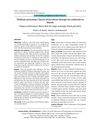 1 citations,
January 2018 in “Acta dermatovenerologica Alpina, Pannonica et Adriatica (Tiskana izd.)”
1 citations,
January 2018 in “Acta dermatovenerologica Alpina, Pannonica et Adriatica (Tiskana izd.)” The herbal extract was found to effectively reduce and prevent hair loss without any side effects.
 1 citations,
January 1996 in “Springer eBooks”
1 citations,
January 1996 in “Springer eBooks” Diet affects baldness; eat balanced, less animal fat, more fruits, vegetables, and cereals.
[object Object]  January 2017 in “Clinical approaches and procedures in cosmetic dermatology”
January 2017 in “Clinical approaches and procedures in cosmetic dermatology” Certain nutrients can improve skin health and treat skin problems safely.
 November 2023 in “The journal of investigative dermatology/Journal of investigative dermatology”
November 2023 in “The journal of investigative dermatology/Journal of investigative dermatology” The article concludes that creating a detailed map of normal human skin at the single-cell level is important.
2 citations,
January 2019 in “Journal of Cosmetics, Dermatological Sciences and Applications” The supplement and lotion significantly reduced hair loss and improved hair health.
2 citations,
September 2015 in “Türk pediatri arşivi : İstanbul çocuk kliniği dergisi” Valproic acid can very rarely cause nail separation, which usually gets better on its own after stopping the drug.
 18 citations,
March 2016 in “Cosmetics”
18 citations,
March 2016 in “Cosmetics” Telogen Effluvium is a condition causing excessive hair loss due to stress, illness, drugs, or hormonal changes, and can be treated with specific products or naturally resolves after 3-4 years.
 March 2024 in “International journal of molecular sciences”
March 2024 in “International journal of molecular sciences” Zinc, copper, and iron are important for skin health and may help diagnose skin diseases.
 2 citations,
May 2021 in “Case reports in dermatological medicine”
2 citations,
May 2021 in “Case reports in dermatological medicine” A 28-year-old man with type 1 diabetes had skin and hair issues due to zinc deficiency.
 56 citations,
January 2013 in “International journal of trichology”
56 citations,
January 2013 in “International journal of trichology” Zinc supplements may be needed to treat hair loss in hypothyroidism.
20 citations,
June 2020 in “Journal of Advanced Research” High-dose vitamin A and E with zinc improved blood sugar control and insulin function in diabetics, but may cause hair loss.
 November 2023 in “Biology”
November 2023 in “Biology” Lower hair copper and copper-to-zinc ratio are linked to more severe coronary artery disease.
 March 2011 in “Journal of clinical and experimental investigations”
March 2011 in “Journal of clinical and experimental investigations” Thallium poisoning can cause hair loss, skin rashes, and nerve damage, and can be fatal if not correctly diagnosed and treated.
 11 citations,
January 2020 in “BMC pediatrics”
11 citations,
January 2020 in “BMC pediatrics” New mutations in the SLC39A4 gene found in twins help understand the genetic cause of acrodermatitis enteropathica.
 15 citations,
May 1997 in “Annals of Internal Medicine”
15 citations,
May 1997 in “Annals of Internal Medicine” Tamoxifen caused hair loss in a 52-year-old woman.
 2 citations,
December 2015 in “Journal of dermatology research and therapy”
2 citations,
December 2015 in “Journal of dermatology research and therapy” People with Chronic Telogen Effluvium mainly have lower iron levels compared to healthy individuals.
 2 citations,
July 2019 in “Journal of psychology & clinical psychiatry”
2 citations,
July 2019 in “Journal of psychology & clinical psychiatry” Zinc helps reduce the severity of depression.
 1 citations,
October 2023 in “The Journal of nutrition, health & aging”
1 citations,
October 2023 in “The Journal of nutrition, health & aging” Higher hair levels of zinc and chromium were linked to less cognitive decline in very old people.
[object Object]  December 2024 in “ACS Applied Materials & Interfaces”
December 2024 in “ACS Applied Materials & Interfaces” The new hydrogel helps heal diabetic wounds by reducing inflammation and improving tissue repair.
 18 citations,
December 2010 in “Journal of Trace Elements in Medicine and Biology”
18 citations,
December 2010 in “Journal of Trace Elements in Medicine and Biology” Women with AGA have more androstenedione and dihydrotestosterone, less copper and zinc; copper imbalance affects AGA; treatment improves hormones and minerals.
 February 2021 in “Austin journal of nutrition & metabolism”
February 2021 in “Austin journal of nutrition & metabolism” Appropriate zinc levels may help prevent hair loss in university students.
72 citations,
October 1992 in “Archives of Dermatology” Recognizing certain rashes can lead to earlier cystic fibrosis diagnosis and better outcomes.
 158 citations,
May 1968 in “The journal of nutrition/The Journal of nutrition”
158 citations,
May 1968 in “The journal of nutrition/The Journal of nutrition” Zinc is crucial for growth and health in rats.
 3 citations,
June 2019 in “Journal of Bangladesh Society of Physiologist”
3 citations,
June 2019 in “Journal of Bangladesh Society of Physiologist” People with hair loss often have lower levels of zinc and copper in their blood.
 2 citations,
September 2022 in “Asian Journal of Microbiology, Biotechnology & Environmental Sciences”
2 citations,
September 2022 in “Asian Journal of Microbiology, Biotechnology & Environmental Sciences” Zinc is essential for plant growth and human health.
 September 2018 in “International Journal of Dermatology”
September 2018 in “International Journal of Dermatology” People with alopecia areata often have lower levels of zinc and vitamin D.
 April 1978 in “Pediatric research”
April 1978 in “Pediatric research” Patients with anorexia nervosa did not show a correlation between zinc levels and taste perception or the severity of their condition.
 264 citations,
January 2008 in “Journal of biomedical optics”
264 citations,
January 2008 in “Journal of biomedical optics” Zinc oxide nanoparticles in sunscreen do not penetrate deep into the skin.
 233 citations,
November 2002 in “The journal of investigative dermatology/Journal of investigative dermatology”
233 citations,
November 2002 in “The journal of investigative dermatology/Journal of investigative dermatology” Creating stronger blockers for skin enzymes might lead to better treatment for conditions like acne and excessive hair growth.
 73 citations,
May 1976 in “JAMA”
73 citations,
May 1976 in “JAMA” Long-term parenteral nutrition without zinc can cause severe zinc deficiency.

























